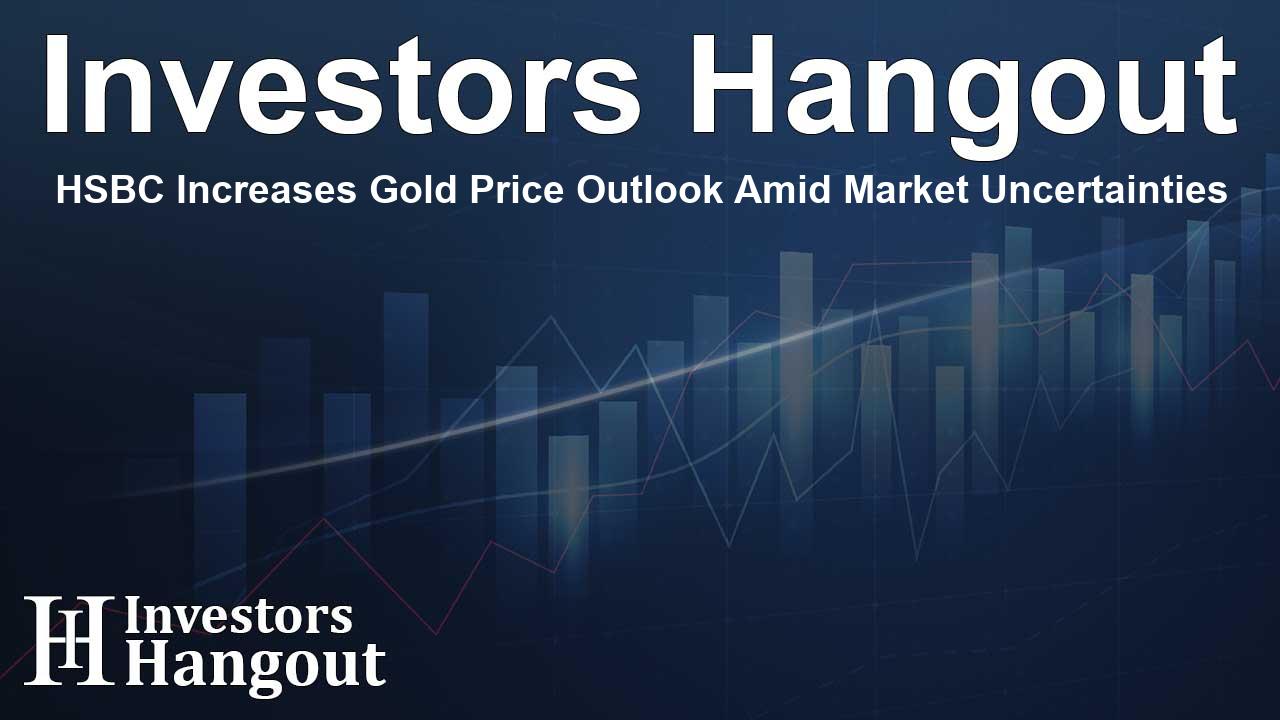HSBC Increases Gold Price Outlook Amid Market Uncertainties

HSBC Adjusts Gold Price Predictions
HSBC recently announced an increase in its average gold price forecast for the upcoming years, projecting the price to reach $3,215 per ounce in 2025, up from a previous estimate of $3,015. This change is attributed to heightened geopolitical tensions, economic uncertainties, and soaring government debt levels.
The Forecasted Volatile Path
The bank has also adjusted its 2026 forecast, raising it to $3,125 per ounce from $2,915. HSBC anticipates a volatile trading range of $3,600 to $3,100 an ounce for the remainder of the year. They have emphasized these projections in a recent note, as the global economic landscape continues to shift unpredictably.
Spot Gold Prices & Market Reactions
As of the latest updates, spot gold was trading around $3,350, with a record peak of $3,500 observed earlier this year, driven by robust demand from investors, central banks, and those seeking protection from geopolitical instability.
Demand Dynamics
Despite prices being at historic highs, HSBC has raised concerns that any further increase beyond $3,500 could stifle physical demand for gold, particularly in key markets like India and China, where consumers tend to be very price-sensitive. This has led to a noticeable shift in market preferences, with platinum growing in popularity as a more affordable alternative.
Safe-Haven Attraction
Ricardo Evangelista, a senior analyst at ActivTrades, highlighted that gold's status as a safe-haven asset is being bolstered by ongoing concerns surrounding the U.S. fiscal outlook and trade-related uncertainties. He noted that gold prices are likely to trend higher in the short term, with the next resistance point estimated at around $3,370.
Central Bank Demand as a Pillar
The past few years have witnessed a significant surge in demand from global central banks, serving as a critical support for gold prices. However, HSBC cautioned that purchase activities might slow down if prices exceed $3,300 per ounce, indicating potential market dynamics.
Long-Term Hedge Against Inflation
Gold continues to be recognized as a long-term hedge against persistent inflation and a declining U.S. dollar. Amid deepening geopolitical divides in various regions, gold's role as a vital portfolio diversifier remains unshaken. HSBC reassured investors that despite possible price fluctuations, gold's foundational appeal remains intact.
Impacts in Canada
In Canada, the soaring gold prices have had immediate effects on market performance, with the S&P/TSX Composite Index seeing a remarkable 15% increase in U.S. dollar terms during the first half of the year. This performance has significantly outstripped that of the S&P 500, largely due to exceptional gains in gold and silver mining sectors.
Expert Opinions
Sadiq Adatia, the chief investment officer at BMO Asset Management, stated that the impressive performance of gold has been a substantial factor in supporting stock prices and protecting portfolios. He noted, however, that the second half of the year may confront challenges in maintaining the same upward momentum.
Current Gold Investments
Notably, SPDR Gold Trust (GLD) has witnessed a year-to-date increase of 27.19%, marking its significance in the current investment landscape. Investors are keenly watching how gold markets will react as economic conditions evolve.
Frequently Asked Questions
Why has HSBC raised its gold forecast?
HSBC raised its gold forecast due to heightened geopolitical risks, economic uncertainty, and increasing government debt levels.
What is the projected gold price for 2025?
The projected gold price for 2025 is $3,215 per ounce, an increase from $3,015.
How are central banks influencing gold prices?
Central banks have shown strong demand for gold, which provides support for its prices; however, buying may decrease if prices go above $3,300.
What are the implications of gold price volatility?
Gold price volatility can impact physical demand, particularly in price-sensitive markets and may shift consumer preferences towards other metals like platinum.
How does gold serve as a hedge against inflation?
Gold is traditionally viewed as a hedge against inflation and currency devaluation, providing a secure asset in uncertain economic times.
About The Author
Contact Evelyn Baker privately here. Or send an email with ATTN: Evelyn Baker as the subject to contact@investorshangout.com.
About Investors Hangout
Investors Hangout is a leading online stock forum for financial discussion and learning, offering a wide range of free tools and resources. It draws in traders of all levels, who exchange market knowledge, investigate trading tactics, and keep an eye on industry developments in real time. Featuring financial articles, stock message boards, quotes, charts, company profiles, and live news updates. Through cooperative learning and a wealth of informational resources, it helps users from novices creating their first portfolios to experts honing their techniques. Join Investors Hangout today: https://investorshangout.com/
The content of this article is based on factual, publicly available information and does not represent legal, financial, or investment advice. Investors Hangout does not offer financial advice, and the author is not a licensed financial advisor. Consult a qualified advisor before making any financial or investment decisions based on this article. This article should not be considered advice to purchase, sell, or hold any securities or other investments. If any of the material provided here is inaccurate, please contact us for corrections.
